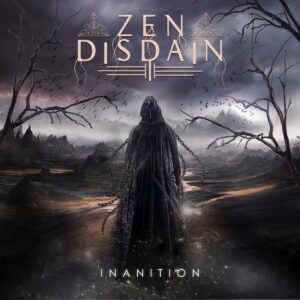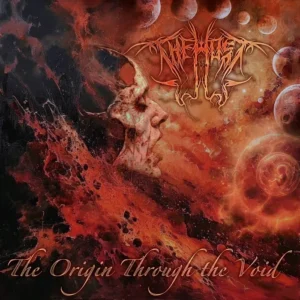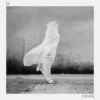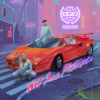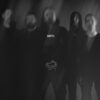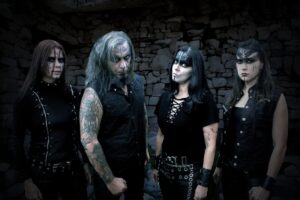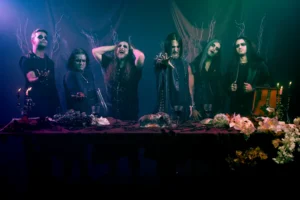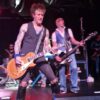Lost Era
Thy Dispraise
•
May 3, 2021
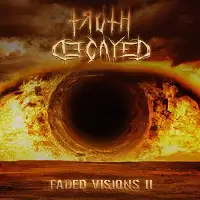
It still takes a certain amount of inner fortitude to play heavy metal. Nowhere is that more true than in Iran, where playing metal – or any secular music, for that matter – could, and does, get you arrested. Last year, ARSAMES had to leave the country after they were sentenced to 15 years in prison; prior to that, CONFESS also fled after being sentenced to 14 years and 74 lashes. Tehran's THY DISPRAISE favors a blend of groove metal and metalcore. They count a woman, singer Sheyda (wife of guitarist and founder Abtin), among their members – by the way, the sexes are segregated in almost every way in the country. So they have two strikes against them in the eyes of the ultra conservative government. Fortitude? Yeah, no kidding. Abtin says they still live in Iran, but do have plans to move. Much of their discontent is reflected in "Lost Era," their first full-length album; their self-titled EP came out last year.
It begins with "Stardust," a mix of absolutely lovely guitar melodies, spare and dreamy, and Sheyda's whispered Persian lyrics. But groove indeed is opener "The Unknown," fat, chunky, and solid – they've got the chops for sure, the riff melodies are carefully crafted and sticky and Mohammad's drumming is extremely technically proficient and confident and he handles the tempo changes with great aplomb. The production is well-balanced, each part distinct. Alireza's growled vocals are distinct, well enunciated in the verses, well paced; Sheyda's wonderful clean vocals in the chorus and slower part are throaty, liquidy, honey-sweet and ringing, monotonic but beautifully so. They trade off on the same lyrics in the slow part and the bridge, and in doing so, intentionally or not, give them an entirely different meaning ("Some want me, and some do not/Some give, and some take/Breathe in, breathe out/It all has just begun"). The first verse could be construed as a reflection on the daring it takes to do what they do, the creative drive to express what's going on around them and to take the risk of doing so ("Being sent out to reach out to the light/As though it's an attempt/To run from a disaster/To take what you are/And jump into the realm/Of the unknown"). The second is wondering if they should even bother ("Too afraid to take a step/Don't know what to think/Can't figure out what is wrong/Nor can think of all that's right"). The chorus has to reflect what they live through as creative people in extremely restrictive circumstances: "I can't comprehend/The circumstances I am in/All this is too much to take/For a blank mind in a world of complexions" (what a great line that is).
The band's musical ability is unquestioned from the start – they've done their homework and are sophisticated songwriters – but they are extremely competent lyrically as well, especially in something like "Freefall." The verses are terrific in their use of metaphor. Two of them are the idea of a seed growing into a plant, then being destroyed, and you could so equate that to not just them as a band in their environment but to anyone growing up in it: "And the new seed cracked/Just to expose to the light/All it has to offer, and maybe to suffer/But never to question, for 'tis the cost" in the first verse; "To grow great and stand tall/To see the sun just to fall/Defoliated, degenerated/To break and get cut down/To the barren infertile ground" in a later one. The chorus is about as pointed as it gets – "We architecture our own destruction ... We were fed with lies/And we keep sucking on." Alireza does it the first time with Sheyda almost imperceptibly in the background, then they switch for the second chorus with her taking the lead. A middle verse is equally direct – "Self-indulgence is the key/To the pocket of the man/That you keep feeding off your hand/The constriction of a norm/Just to put you into form," the whole idea of societal control – and the breakdown is a masterstroke of social commentary, "To be fed for an entire life with feces/As you get your new faces/Colourized, Colonized, Consumerized."
"The Game" is a devilish mix of tempo changes, but a delicious head-bobbing swing in the verses slows in the prechorus and picks up again in the chorus, where it goes at intriguing cross-purposes with Sheyda's vocal. If the previous one was direct, you haven't seen anything yet. Alireza roars, "At the perfect stage of my youthful life/I was asked to give in/All I was for what I wasn't part of/Never rejected/Nor ever embraced it/Only did what I was expected to do/It was what I thought was right to do/Never had the time for doubt/No questions, must follow/No feelings, I'm hollow." Wow. Sheyda's chorus is then critical to the entity that has done this, "You erased/You created all these lies/You defaced/Around yourself as walls/And around us as bars." Alireza's second verse continues the thought of the first: "For our comfort/For our safety/I have only done what was right ... Never played the waiting game/I was told not to play the game." And he's not done yet in the bridge – "You smash your hammer/Thinking you are just/But is it just when I die by another hand?" – or in the breakdown as he drives it home, "By your system, either way I fail/Before I even plead for my innocence/As if this war was mine/It was my choice/I choked my voice/For what I felt, something vague, an emptiness." This can only be the bare minimum of what the band must experience, but boy, you get it with lines like these.
"Outflow" is a less-than-a minute instrumental, so short it almost qualifies as either an outro from the previous track or an intro to the next. "Wrong Core" is billed as a tribute to LAMB OF GOD, but why it is isn't immediately clear – maybe in that it's an emulation of their sound, maybe because the title is a play on the disputes as to whether LOG is metalcore or not, maybe it's in reference to the line late in the song, "As you are the core/Of what's wrong in this world." Regardless, the snappy groove of the verses, underlaid by sharp riff commentaries, and the jaggedly erratic section before the wah-filled solo are notable in and of themselves. The verses are a critical sociopolitical litany: "Burn the bridges behind you/Walk over what gives you power/Steal from, feed on/You are nothing but a leech," in the first; what you have to do to stay alive in their world, "You say that you care/But you just say/Just to be safe/And not to be rendered as the enemy" in the breakdown; "You're the enemy/Of our circumstances/On your grave shall we dance/As you are the core/Of what's wrong with this world" in the third. So too is the gorgeous melody of Sheyda's chorus as she sings the powerfully direct words, "Manufacture a new system of life through death/Through the death of the Others/You have learned your ways."
"Deceitful" is built on a series of strong riff melodies, the beginning one (reprised at the end) and a slight shift in it leading into the second verse (although the solo there might slow the song's momentum just a bit, if you were going to be picky), not to mention further excellent drumming from Mohammad (his speed is matched by his feel and sensitivity). This one is more inward-looking, more self-critical, and it makes many valid points – a commentary on social media, maybe, in "We watch the world tell us how to live every day/We suppose we don't question, but we still question"; the whole idea of how we shift our behavior as the wind blows ("we live our lives through the lies/That we tell ourselves every day") and aren't true to ourselves, with lines like the beautiful "Every day is just another lie/That furthers us from ourselves/And what we would dream of/The dreams in which we are real." The chorus expands on that idea: "We bite a lie right off another/We hide and then we cry/For our own self-made self/The one we refuse to stop, or to change" (like we can't help lying, we tell one lie after the other). The second verse is our feeble attempts to change: "We feel a need ... but regardless we won't ever change,", in our "faces, our colours, our clothes and dresses ... just to look new, under a fresh-looking lie." The final biting chorus is how fruitless this all is, "You will never lie when you lie/Because you are made of lies," like any attempt to change or be better is a lie in itself.
Dramatic guitar melody and counter-drumming at the start of "Post-Ending Life" settle in together and get comfortable by the verse; before the outro, the drumming shifts a bit to add even more texture. By the title, this is kind of a post-apocalyptic or post-death scenario, like there is no heaven, as Alireza howls, "Where all are sentenced to an eternity of death," and that there is "No more tomorrow/No morning to come anymore." He almost prophesizes in the slower second verse, "Nevermore grief and agony, and forevermore resentment and shame/we fight no more yet still resist the judgment which is passed on us," and that we are indeed doomed in the wonderful imagery of the line, "We fall into the lungs of the earth, as heavens shatter and howl." Sheyda's piercing, droning voice adds to the feel of despair in the chorus and fleshes out the theme, "Evermore shall we carry the emptiness/The post-ending life of consequences/The frail past and the frail words/Coming out of a frail mind, at a time."
Abtin and Mohamadreza are terrific in delivering the despondent, pensive guitar melodies of "All Is Lost," sensitive, so in tune with the material. Don't dare call this a ballad, even though it kind of is one sonically (especially in the solo section), because the subject matter is completely internal, telling of "one who's lost it all" and who has rather lost the will to live, as the stunning chorus relates: "These eyes look so they see/And tell to a hopeless mind/One that's awaiting end/An end in which all is lost," and the devastating observation of the lines, "A mind once ambitious/Alive, with purpose/Is now a deadbeat," as if to say that mind has become lazy, is dead weight on the psyche. The second verse is what got this person to this point: "The activity lost its ambition/And later lost its purpose," perhaps brought about by profound loss, as it hints, "Mastering the art of grief reconstructs all design/And values upon defeat." You could argue it's a bit wordy, but there's a powerful intellect at work in these words, a shrewd yet feeling observer. It's so effective at the end when the chorus is repeated and modulated and set to a soaring, hopeful blend of guitar and keyboards (similar to the solo), but it still ends abruptly on that same line, as if to say don't forget what we've been talking about here. This is a showcase for the wonderful nuances of Sheyda's voice, from warm lower register in the verses to crystalline-pure higher end in the chorus – she doesn't use vibrato, but that just solidifies the mood, that unaffected, round tone drives home the lost, lonely feel of the words.
Out of uncertainty and stress and danger – and great personal risk – often comes great art. "Lost Era" is just that.
10 / 10
Masterpiece
Songwriting
Musicianship
Memorability
Production

"Lost Era" Track-listing:
1. Stardust
2. The Unknown
3. Freefall
4. The Game
5. Outflow
6. Wrong Core (tribute to LAMB OF GOD)
7. Deceitful
8. Post-Ending Life
9. All Is Lost
Thy Dispraise Lineup:
Alireza Shafiei - Vocals
Sheyda Mohammadi - Vocals
Abtin Zahed - Guitar
Mohamadreza Rezaei - Guitar
Mohammad Mirboland - Drums
More results...
